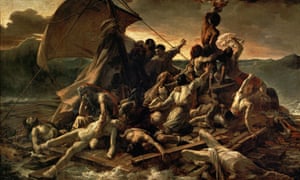
Painting as an act of empathy … where is that today? The Raft of the Medusa, by Théodore Géricault. Photograph: Heritage Images/Getty ImagesIn 1819, people were outraged by the Raft of the Medusa’s depiction of migrants abandoned at sea. Today, most people ignore those dying to cross borders, the genocidal tragedy of our time. Racism is the only explanation
Nearly 200 years ago, Théodore Géricault painted a masterpiece of pity that puts modern Europe to shame.
The Raft of the Medusa (1818-19) is one of the most startling and powerful paintings in the world. It is also a call for compassion, humanity and common decency. Striking in reproduction, it is truly harrowing in real life, all 7x5 metres of it, looming over you in the Louvre.
Darkness is literally eating up this painting; a deathly shadow seems to suck you into it. There is a black hole of horror at its heart.

10 truths about Europe’s migrant crisis
Read more
And now I have to ask: why can’t we modern Europeans show the same compassion and humanity that made our forebears flock to see this protest against callous indifference to people abandoned at sea?
The Medusa was a French navy ship that got into trouble off west Africa in 1816. About 147 people were put off the ship on an open raft, in a heartless decision that contemporaries blamed on the recently restored French monarchy. They were cast helplessly adrift at sea, just as so many migrants making the perilous attempt to cross to Europe have in our time been cruelly left to drift in unseaworthy craft by unscrupulous people traffickers. Only 15 people survived the raft of the Medusa.
Géricault’s painting depicts a tragedy in the Atlantic rather than the Mediterranean – otherwise, the parallels with today’s migrants are terrifying. But there is one appalling difference. Géricault can imagine what it was like to be in this catastrophe. His painting is a monumental attempt to force the spectactor to feel the horror of these events and the suffering of these people. We refuse that empathy to people who die trying to cross borders, who are drowned at sea or killed trying to get through the Channel tunnel.
On immigration, the language of genocide has entered the mainstream
Suzanne Moore

Read more
The Raft of the Medusa breaks the border between art and life. It is literally so large that the action seems to burst into reality, spilling out of the frame. Standing before it you feel the sea surge towards you. In this disturbing experience of looking, the anguish of the people on the raft becomes vivid and immediate. We are there beside them. As one young survivor hopefully tries to signal to a distant ship, an old man sitting among the dead has already given up hope. The mass of humanity is arranged as a pyramid of hope and despair, from those who struggle to keep going and are excited about the ship on the horizon to pitiable corpses half-slipping into the sea.
Géricault makes us feel the loss of each of the dead and the pain of each of the living. This painting is an act of empathy for our fellow human beings. But where is such empathy today?
A few days ago, Leoluca Orlando, the courageous reforming mayor of Palermo who has fought organised crime for decades, broke ranks with this generation’s callous dishonesty to speak the truth.

FacebookTwitterPinterest Migrants in Calais. Photograph: Zoltan Balogh/EPA
“In the future, the European Union will be held responsible for this genocide, exactly like we held Nazi fascism responsible for genocide 70 years ago,” he said. “It’s not possible to stop human mobility in the world and if you try to stop it with violence, we are responsible for genocide.”
Meanwhile, as the British government tries to convince voters it is “doing something”, its language has become shamefully callous. Vile words about “swarms” of “marauding” migrants are brutal. But they reflect a cynical calculation that British public feeling too is brutal, just as it appears to be across much of the continent, while only southern Europeans such as Orlando, who see the real tragedy of our time up close, occasionally tell the human truth about it.
Are we really, as a nation, so heartless that when desperate people risk their lives to try and get in our country we don’t ask why, but merely resent the interference with holidays and hassle for lorry drivers?
Probably only racism can explain such a deep intolerance, such a terrifying inability to imagine oneself in the place of others.

Migrant life in Calais' Jungle refugee camp - a photo essay
Read more
Why is America so different? Republican presidential candidates are currentlycompeting in offensiveness to Latin American migrants but they’re on a loser – President Obama’s embrace of Latin voters and tolerance of migration was a winning factor in his second presidential victory. America is becoming an ever more plural society, while Europe closes doors and turns a blind eye to the terrible deaths of people trying to cross borders for a better life. Your poor and huddled masses? They are not welcome here.
Is it some ancient echo of the mercantilist European economic theories of 350 years ago that imagined national economies as closed systems? Yet it is, today, economically illiterate to believe that migration is bad for the (globalised) economy. It is obviously good. It is creative.
We have lost the basic human decency that should be synonymous with Europe, and Britain.
The Raft of the Medusa condemns us.http://www.theguardian.com/

Δεν υπάρχουν σχόλια:
Δημοσίευση σχολίου